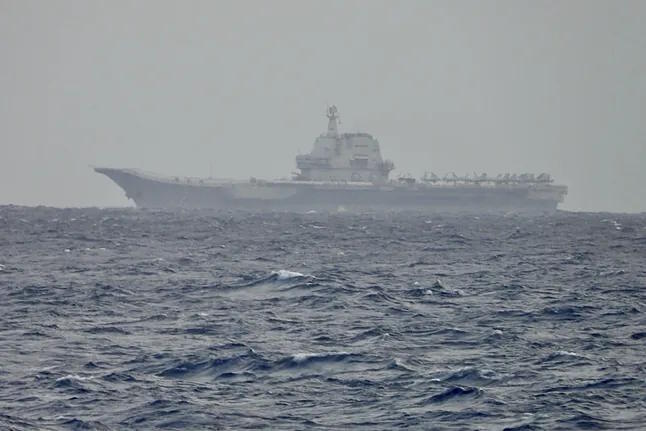"The independence of Taiwan is a demon that attracts disaster and must be exorcised". With this phrase (written below a poster showing warships and fighter jets surrounding Taiwan, an island the size of Extremadura with a population of 23 million) the Chinese army announced a new round of military exercises around the self-governing island that Beijing considers a separatist province.
Colonel Shi Yi, spokesperson for the Eastern Theater Command of the People's Liberation Army of China (PLA), the unit leading the maneuvers, explained on Tuesday morning that the navy, air forces, as well as rocket forces - the brigades handling ballistic missiles with nuclear warheads - were participating in a large-scale drill aimed at practicing a blockade on the democratic island.
"The joint exercises will practice approaching Taiwan from multiple directions," Shi pointed out a week after Taiwanese President Lai Ching-Te referred to China as a "hostile foreign force." An animated propaganda video from the Chinese army, accompanying the poster about the maneuvers, depicted Lai as an insect held by a pair of chopsticks over a burning Taiwan.
"These exercises focus mainly on combat air-sea patrols, joint seizure of comprehensive superiority, assault on maritime and land targets, and the blockade of key areas and sea routes in order to test the joint operational capabilities of their troops," Shi continued. From Taipei, the Taiwanese Ministry of Defense reported detecting the Chinese aircraft carrier Shandong near its coasts leading a group of 19 PLA warships.
Colonel Shi emphasized that these new maneuvers were "a severe warning and a strong deterrent against the separatist forces of Taiwan." From Beijing, relying on the usual aggressive narrative they use whenever they sail their ships and jets around Taiwan, they insist that they will do everything possible to "safeguard China's sovereignty and national unity."
The Chinese army began conducting large-scale invasion and blockade drills on Taiwan after the provocative visit in the summer of 2022 by then Speaker of the US House of Representatives, Nancy Pelosi. In April 2023, when former Taiwanese leader Tsai Ing-wen traveled to California to meet with Kevin McCarthy, then Speaker of the House, the Chinese army rehearsed launching fighter jets from aircraft carriers. A month later, they conducted another drill of air attacks on Taiwanese military targets while the ships practiced a naval blockade.
Last October, the PLA deployed 153 fighter jets and nearly thirty warships, including one of their three aircraft carriers, to conduct a total blockade exercise on seven points around the island, with the purpose of isolating Taiwan from rapid assistance from the United States. In these maneuvers, similar to those starting this Tuesday, the rocket force also participated with arsenals of short and medium-range ballistic missiles, such as the Dongfeng-17, which can maneuver at hypersonic speed (five times the speed of sound), making it difficult to detect by defense systems. A few days later, Beijing conducted other major military exercises, but this time with live-fire drills.
Last week, the spokesperson for the Chinese Ministry of Defense, Wu Qian, stated that the PLA would maintain constant combat readiness, be prepared to fight at any time, and ensure victory. "We will resolutely crush all separatist plots," he declared.
The world's second-largest power is flexing its military muscle again this week, while in Taipei, they rely on continuing to have the deterrent security umbrella of their main ally, the United States, which is the island's main international supporter and primary arms supplier. Officials from Taiwan's Ministry of Foreign Affairs, in conversations with this newspaper, state that relations with the Trump administration have significantly improved in recent weeks after a rather uncertain start due to concerns about whether the US president would change his country's official stance as he did with Ukraine.
Upon arriving at the White House, Trump pressured Taiwanese authorities by saying they were not spending enough money on their defense and accused Taipei of stealing the much sought-after semiconductor industry from Washington. But recent US movements towards Taiwan indicate a significant rapprochement.
Contacts between Republican lawmakers and those of the ruling Democratic Progressive Party have intensified. A few days ago, the Wall Street Journal reported that Pentagon officials had met with their Taiwanese counterparts to assure them that Washington maintained its commitment to security guarantees against an attack by the Chinese army, although President Trump, unlike his predecessor Biden, has not publicly stated that the United States will defend Taiwan against a Chinese invasion.
